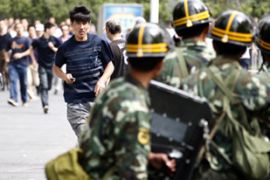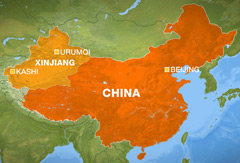Troops patrol riot-hit Urumqi
Chinese troops out in force in effort to restore calm following ethnic clashes

|
Follow Al Jazeera’s China reporter Melissa Chan.
|
However, she said tensions remained high athough there had been no reports of further clashes as had occured on previous days.
Long convoys of armoured cars and troop trucks have been patrolling the streets of Urumqi, with a particularly heavy presence in Uighur neighbourhoods of the predominantly Han Chinese city.
Army helicopters have also been conducting regular flights over the city.
The patrols and an overnight curfew are part of a sweeping crackdown ordered by the Chinese authorities in an effort to keep a lid on the unrest.
‘Execute them’
| In depth |
|
|
More than 1,000 people are reported to have been arrested and on Wednesday a senior official warned that anyone found guilty of murder would be executed.
“To those who committed crimes with cruel means, we will execute them,” Li Zhi, the Communist party chief for Urumqi, told reporters.
Correspondent Steve Chao, reporting from Beijing, said China’s leaders appeared to be pushing for a tough response to the violence and more people were likely to be arrested in the coming days as authorities round up anyone they suspect could stir up unrest.
On Thursday reports said an outspoken economist who had championed Uighur rights had disappeared after presumably being arrested by police.
Friends of Ilham Tohti said he had called them earlier to say police had given him formal notice to say he would be detained.
Fearful
| Xinjiang and the Uighurs |
|
|
On Wednesday Hu Jintao, the Chinese president, cut short a visit to the G8 summit in Italy, returning home to personally oversee the government’s handling of the crisis.
Since Sunday’s riot tensions have remained high in Urumqi with mobs wielding makeshift weapons roaming the city and many residents fearful for their safety.
On Tuesday thousands of Han Chinese rampaged through Urumqi’s streets, smashing Uighur-owned shops and stalls and calling for revenge against the Uighurs who they say started the unrest.
Groups of Uighurs also took to the streets and government forces fired tear gas at the crowds before ordering the curfew in an effort to maintain control of the city.
Chinese authorities have blamed Uighurs protesters for Sunday’s unrest, but have also condemned members of the Han Chinese community for stirring up tensions in the wake of the riot.
Repression
Uighur groups say repressive policies by China combined with years of mass migration to Xinjiang by Han Chinese, China’s largest ethnic group, have stoked ethnic tensions and sown the seeds for violence.
The Turkic-speaking Uighurs have long complained of repression and discrimination under Chinese rule, but Beijing insists it has brought prosperity to Xinjiang, a region that has seen annual growth rates of up to 17 per cent in recent years.
On Wednesday, Recep Tayyip Erdogan, Turkey’s prime minister, called for an end to the violence.
“Our expectation is for these incidents that have reached the level of savagery to be rapidly stopped,” he said.
The prime minister and Ahmet Davutoglu, Turkey’s foreign minister, made separate calls to China to bring “those responsible to account” in a transparent manner.
“We are following the events with great concern, worry and sadness,” Erdogan said
According to Chinese state media, Sunday’s clashes erupted after a demonstration over an industrial dispute in southern China in which two Uighurs died, turned violent.
Beijing singled out Rebiya Kadeer, head of the World Uighur Congress, for “masterminding” the unrest.
But Kadeer, a Uighur businesswoman who was jailed for years in China before being released into exile in the US, has rejected the accusations, saying from Washington DC that they were “completely false”.



